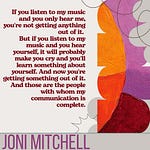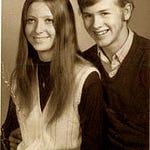Love Light
Recently, I completed a focused therapy project with a licensed counselor. I’m working on some recent struggles I've had communicating with someone I love, someone very close and special to me, someone who doesn’t think as I do, who doesn’t feel how I feel about others. This person is a very kind soul to those they call their own. This person thinks very differently about people who aren’t included in that category of “their people.” It doesn’t matter who they think their people are. Everyone has people who aren’t their own kind, whatever lines we draw to make that determination. But it’s how we treat the people outside our circles that determines our moral worth as human beings. Relationships, it turns out, are very complicated when we stare too closely at them.
But relationships can be simple, too. When you truly love one person, you can love all people. Love really doesn’t stare too hard or too long. Instead, Love breathes a sigh of relief in the waking moment, and then Love moves on to appreciate the next moment. Love is not an emotion because all emotions have a beginning, middle, and ending. Love is a light that, when it’s turned on, stays on.
Past And Present, As They Are
One phrase my counselor taught me was, “The past and the present as they are.” I love the poetic quality of this phrase because it requires some creativity to interpret. Past is all the things that have happened up to this moment. All the laughter, the crying, the dreading, all of it. We can each take all of our experiences, with all the emotional baggage associated with them, stuff it all in a mental bag, and then write PAST on the tag of the bag. We’ve lugged that bag up to this spot, which is the present moment. We can reach into that bag and respond to this moment the way we have a million times before. Or, we can set the bag down and start living our lives, see other people as they are right now. And then we can choose to be better people together. What a powerful choice that is, to choose to be better than we were yesterday.
We should expect each other to be better people. But, unfortunately, we cannot control the behavior of other people. We can’t force them to think or feel how we desire them to think and feel. We can only control our own behavior in this life.
From here, the question should be, “What is my behavior?” Obviously, we have to start looking at what we are saying and doing in our relationships, but it’s more than that. We must become aware of what we are thinking and feeling at all times. The most crucial part of self-analysis is to understand one’s intellectual tides and the emotional gravity that moves them.
During my counseling session, I learned the technique of using open hands when I’m talking with other people. Palms up, as if receiving a gift, they said. It changes the way we communicate. I thought it sounded dumb when I first understood the task. And I forgot a lot at first. Eventually, I caught myself and became aware of when I was using my hands when talking and flipped my palms up and this was a good change of behavior. I started to move past some barriers of humility that have been holding me back.
And then, I moved into managing my responsive behavior when challenged. I’ve had an enormous struggle with this my whole life, losing control when challenged. I was a little guy growing up, tiny and frail. The whole world was bigger than I was, and I was just this little thing floating around in it. But early in life, I learned that one’s will has no sense of height, and as emotional creatures, we can exert our will on others with significant impact. Sometimes, winning a confrontation comes down to who is most emotionally inspired to scream. That was me. In grade school, a mean girl called me “Shrimp.” I was so angry that I tensed all of my muscles up and screamed until I broke nearly all the blood vessels in my face. That’s how angry I could get as a child. Imagine when I grew up.
I was saved by the love of so many people, including this person I’m struggling with now. The struggle is that we only have so many minutes to live in this life. I don’t want to waste a single one of them, not experiencing Love so that I can suffer under strife; call me selfish, but that’s what my best friend dying last year taught me. Seize the day. Gather ye rosebuds because, in this life, Robin Williams went from making Dead Poet’s Society to hanging himself in an empty house because he couldn’t take another second of it. People are in real pain out there. And this person is in pain right here. I am working on this pain so that I can either move past it or learn to live with it so effectively that it doesn’t mess up my personal relationships anymore.
PAUSE —> NOTICE —> CHOOSE
I learned this technique, as well. Pausing means taking slow, deep breaths when my nerves start rising, and I can feel the chokepoint triggers of my anger coming up fast. Slow, deep breaths in a misty red fog and I’m trying to inhale all that red vapor of anger and exhale clean transparent calm, letting that anger float by me like a meteor shower I just passed through in outer space. Just because I’m angry doesn’t mean I need to let that anger out whenever my nerves get up. But if I’m pausing to notice what my feelings are right now, what I’m thinking right now, then I’ve created distance between reacting to a tense situation with anger and responding with wisdom. This takes work, but it’s short work because it happens in the living moment. Mostly, it’s just a tax on pride.
Over time, this sensitivity about one’s inner emotional wave patterns becomes an awareness that powers patience. Meditation helps with this; it’s training for a state of calm as the resting baseline of our awareness and behavior. This is real power, the most we can hope for as living souls in this crazy world built on this beautiful planet. We carry this state of grace with us when we leave. I like to tell myself this because it makes me feel better and it makes me think of my late Grandmother, who I called “Memaw” for 45 years.
My Memaw
She passed away from Covid in 2020, died poor and alone in a hospital room, surrounded by the nurses who took care of her during those final days. Those wonderful nurses sang hymns to her and made sure that she had her Bible in her hands, and passed away with dignity. What a service offered in a time of total darkness. So she was not alone, even though I was not there with her, but she was lonely without the presence of the ones she loved most in this world.
When I finally stand before her grave, I’m going to thank her for showing me what dignity is in this life. My Memaw may have been poor in resources, but she was a monarch in spiritual grace. And she and my Uncle just didn’t get along the last several years. He wouldn’t come to see her in the hospital in the days before she died, even though she begged him through all the channels she could light up and ask. Finally, he did come to her funeral. I watched over the webcam that the funeral home had set up to allow extended family and friends during the pandemic. I saw him walk up to her casket and look down, but he walked away pretty fast. That’s all I saw, but that’s not all that happened. He went home and shot himself that night. I don’t know what that time was like for my Uncle between when he walked out of the camera’s frame and pulled the trigger on that gun, but I think it was probably a living Hell. It makes me terribly sad and it scares the shit out of me.
And because I’m scared nearly to death about ending up in such an awful emotional state, I want to learn to live with my anger and grief or learn to let it all go entirely. This is where CHOOSE comes in. “What would a calmer, wiser version of myself choose to do right now?” Imagine asking ourselves this question before we respond to a situation that isn’t life-threatening. What are three options to choose from? Flip my palms up and ask the question again: “What would a calmer, wiser version of myself choose to do right now?” Give me three options to respond to this situation.
Validation
It turns out that validation is critical to reconciliation. It’s okay to validate someone without approving what they have said and done. I learned this during my counseling sessions because I read it in one of the therapy modules. How can I validate this person’s anger without agreeing with it, or rising to meet it? Our expectations for how other people should behave almost always extend beyond that person’s capacity to deliver; this is especially true if there isn't communication established in mutual dignity that is delivered with clarity and received with impact.
I wrote this down: “Validation is acknowledging that a person’s emotions, thoughts, and behaviors have causes and are understandable, based on that person’s perspective and situation.” In other words, while I don’t have to agree with someone to validate them, I can’t make proper amends until I validate that person’s dignity, which we both share by nature of being humans living on this planet. We must validate the person (or people) on the other side of the lines we draw between my people and those people. Suppose there isn’t validation on the other side of that line. In that case, we’re all just modern-day emotional Vikings, pillaging what we can to survive another day, existing but not living.
Love With Curiosity
If we do not love with curiosity then we die from boredom. We must do this because it is the marker of being fully alive in this living moment. I sat down one day, towards the end of my counseling, and I wrote out a simple code that I will seek to live by in this life of purpose:
I want relationships in my life with people who expect the following from me:
I will not manipulate their affections or intentionally say things to upset them.
I will tell them honestly how I feel when they ask or when I feel they need to know.
I will accept them as they are, provided they do not deliberately harm themselves or other people.
In return for my commitment to live by this code, I should also be able to expect these morals reflected in the behavior of my friends and family, and so should you. We each deserve this because of our common human dignity.
Calling Out Amends As Made
Suppose we can agree on rules that acknowledge this shared dignity. If so, we can move on to validating each other, and when we all feel validated, this is what trust feels like.
With trust, we can finally call amends out as made.
Amends are only authentic when they happen simultaneously on both sides of a conflict. If contrition only happens on one side of a damaged relationship, this is like a sinking ship bailed out on only one side of the hull. The boat still sinks; it just takes more time to do it.
Human relationships are like ships that sail. The vessels built with sturdy materials, crafted with kindness and care, are the ships that sail far and take on no water from the Sea of Trauma. But, on the other hand, shoddy ships, built fast with careless hands and reckless hearts, take on water quickly and sink before they can even leave the harbor.
We are humans with hearts birthed from the sea and we are born together to sail until it ends.














Share this post